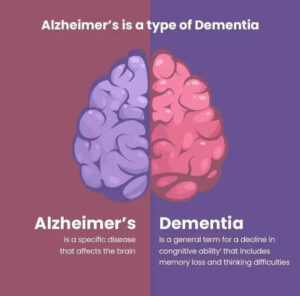What is Dementia?
Dementia is an umbrella term used to describe a group of symptoms that affect cognitive function, including memory, thinking, and reasoning. It is not a specific disease but rather a broad category of brain disorders that lead to a decline in mental abilities severe enough to interfere with daily life. Dementia can result from various underlying diseases or conditions that damage the brain, with symptoms ranging from mild memory loss to severe cognitive impairment.
What is Alzheimer’s Disease?
Alzheimer’s disease is the most common form of dementia, accounting for 60-80% of cases. It is a progressive neurodegenerative disorder that primarily affects memory and other cognitive functions. Alzheimer’s disease typically begins with mild memory lapses and confusion but gradually worsens over time, leading to significant memory loss, impaired reasoning, and eventually, the inability to perform everyday activities.
What Causes Alzheimer’s Disease?
The exact cause of Alzheimer’s disease is not fully understood, but it is believed to involve a combination of genetic, environmental, and lifestyle factors. Key features of Alzheimer’s include the buildup of amyloid plaques and tau tangles in the brain, which disrupt communication between nerve cells and lead to cell death. Over time, these changes severely affect memory, reasoning, and other cognitive functions.
What are the Main Other Types of Dementia – and What Causes Them?
Aside from Alzheimer’s, there are several other types of dementia, each with its own causes:
- Vascular Dementia: This type occurs due to reduced blood flow to the brain, often following a stroke or series of small strokes. It leads to cognitive impairment that can vary depending on the severity and location of the brain damage.
- Lewy Body Dementia: Caused by the buildup of abnormal protein deposits called Lewy bodies in the brain, this type of dementia affects memory, movement, and mood. Symptoms often overlap with those of Parkinson’s disease.
- Frontotemporal Dementia: This type of dementia results from the degeneration of the frontal and temporal lobes of the brain. It often affects personality, behavior, and language skills.
Risk Factors
Risk factors for dementia and Alzheimer’s disease include age, family history, genetics, and lifestyle choices such as diet, exercise, and smoking. While aging is the most significant risk factor, conditions like high blood pressure, diabetes, and obesity can also increase the risk of developing dementia.
Treatments
There is currently no cure for Alzheimer’s disease or most other forms of dementia. However, treatments are available to manage symptoms and improve the quality of life. Medications can help reduce cognitive symptoms, and therapies such as cognitive stimulation and physical exercise may slow the progression of the disease. Lifestyle changes, support from caregivers, and specialized care can also play a crucial role in managing the condition.

